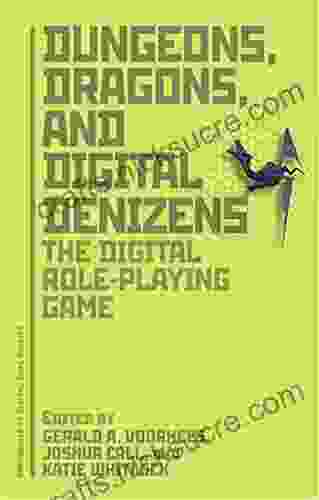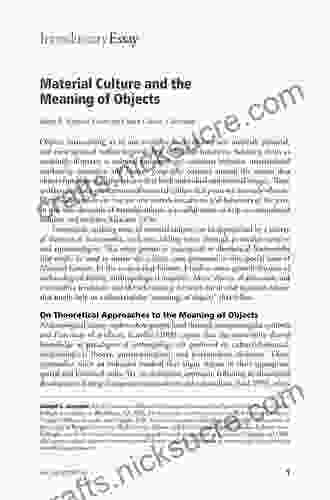The Anthropology of Parliaments: Entanglements in Democratic Politics

Parliaments are central institutions in democratic politics. They are the spaces where elected representatives debate and pass laws, scrutinize the government, and hold it to account. As such, parliaments play a vital role in the functioning of democratic societies. However, parliaments are not simply neutral spaces for political debate. They are also complex and contested sites where power relations are negotiated and social identities are performed.
4.4 out of 5
| Language | : | English |
| File size | : | 8958 KB |
| Text-to-Speech | : | Enabled |
| Screen Reader | : | Supported |
| Enhanced typesetting | : | Enabled |
| Word Wise | : | Enabled |
| Print length | : | 240 pages |
The anthropology of parliaments is a growing field of research that seeks to understand the social and cultural dimensions of parliamentary institutions. Anthropologists have conducted ethnographic research in parliaments around the world, studying how they operate on a day-to-day basis, how they are shaped by the broader political landscape, and how they impact the lives of citizens.
This article draws on ethnographic research in the parliaments of the United Kingdom, India, and South Africa to explore the anthropology of parliaments. It examines how parliaments shape and are shaped by the broader political landscape, how power relations are negotiated within parliaments, and how social identities are performed in parliamentary spaces.
Parliaments and the Broader Political Landscape
Parliaments do not exist in a vacuum. They are part of a broader political landscape that includes political parties, interest groups, the media, and the public. The relationship between parliaments and the broader political landscape is complex and dynamic. Parliaments are both shaped by and shape the broader political landscape.
On the one hand, parliaments are shaped by the political parties that dominate them. The party system in a country will determine the composition of parliament, the rules and procedures that govern parliament, and the issues that are debated in parliament.
On the other hand, parliaments also shape the broader political landscape. Parliaments pass laws that affect the lives of citizens, they scrutinize the government, and they hold it to account. In this way, parliaments play a vital role in shaping the political landscape of a country.
Power Relations within Parliaments
Parliaments are not simply neutral spaces for political debate. They are also complex and contested sites where power relations are negotiated. Power relations within parliaments are shaped by a variety of factors, including the party system, the rules and procedures that govern parliament, and the personal relationships between MPs.
The party system in a country will often determine the distribution of power within parliament. In countries with a two-party system, power is typically concentrated in the hands of the two major parties. In countries with a multi-party system, power is more dispersed, and smaller parties may play a more significant role in parliament.
The rules and procedures that govern parliament also play a role in shaping power relations. These rules and procedures determine who can speak in parliament, how long they can speak, and what topics can be debated. They also determine how laws are passed and how the government is held to account.
Finally, power relations within parliaments are also shaped by the personal relationships between MPs. These relationships can be based on party affiliation, ideology, or personal friendship. They can also be based on patronage or clientelism.
Social Identities in Parliamentary Spaces
Parliaments are not only sites of power relations, but they are also sites where social identities are performed. MPs come from a variety of backgrounds, and they bring their own social identities into the parliamentary space. These identities can include gender, race, ethnicity, religion, and sexuality.
The performance of social identities in parliamentary spaces can have a significant impact on the way that parliament operates. For example, the presence of women in parliament can challenge traditional gender roles and stereotypes. The presence of MPs from minority backgrounds can challenge racism and discrimination.
However, the performance of social identities in parliamentary spaces can also be problematic. For example, the use of racial slurs or homophobic language in parliament can create a hostile environment for MPs from minority backgrounds. The performance of social identities in parliamentary spaces is therefore a complex and contested issue.
The anthropology of parliaments is a growing field of research that seeks to understand the social and cultural dimensions of parliamentary institutions. This article has drawn on ethnographic research in the parliaments of the United Kingdom, India, and South Africa to explore the anthropology of parliaments. It has examined how parliaments shape and are shaped by the broader political landscape, how power relations are negotiated within parliaments, and how social identities are performed in parliamentary spaces.
This article has argued that parliaments are not simply neutral spaces for political debate but are instead complex and contested sites where power relations are negotiated and social identities are performed. Understanding the anthropology of parliaments is therefore essential for understanding the functioning of democratic societies.
4.4 out of 5
| Language | : | English |
| File size | : | 8958 KB |
| Text-to-Speech | : | Enabled |
| Screen Reader | : | Supported |
| Enhanced typesetting | : | Enabled |
| Word Wise | : | Enabled |
| Print length | : | 240 pages |
Do you want to contribute by writing guest posts on this blog?
Please contact us and send us a resume of previous articles that you have written.
 Fiction
Fiction Non Fiction
Non Fiction Romance
Romance Mystery
Mystery Thriller
Thriller SciFi
SciFi Fantasy
Fantasy Horror
Horror Biography
Biography Selfhelp
Selfhelp Business
Business History
History Classics
Classics Poetry
Poetry Childrens
Childrens Young Adult
Young Adult Educational
Educational Cooking
Cooking Travel
Travel Lifestyle
Lifestyle Spirituality
Spirituality Health
Health Fitness
Fitness Technology
Technology Science
Science Arts
Arts Crafts
Crafts DIY
DIY Gardening
Gardening Petcare
Petcare Andrew Skurka
Andrew Skurka Suzanne Corkin
Suzanne Corkin Phil Gaimon
Phil Gaimon Gil Capps
Gil Capps Drew Harris
Drew Harris Abigail Hing Wen
Abigail Hing Wen Susan Zeppieri
Susan Zeppieri Michael Crawley
Michael Crawley Louise Thaden
Louise Thaden Chaz Scoggins
Chaz Scoggins Steve Griffith
Steve Griffith Abbas Kazerooni
Abbas Kazerooni Christopher Black
Christopher Black Hans C Ohanian
Hans C Ohanian Rex Ogle
Rex Ogle Rosie Pope
Rosie Pope John Kean
John Kean Lavinia Collins
Lavinia Collins Tony Soper
Tony Soper Arthur Turrell
Arthur Turrell Sarah Maslin Nir
Sarah Maslin Nir Carmen Moreno
Carmen Moreno Peter Harrison
Peter Harrison Laura Sebastian
Laura Sebastian Aaron Lee Johnson
Aaron Lee Johnson Fred Fields
Fred Fields Deborah Madison
Deborah Madison Laura Peyton Roberts
Laura Peyton Roberts Stefan Ball
Stefan Ball Casey Robson
Casey Robson Michael N Mitchell
Michael N Mitchell Bathroom Readers Institute
Bathroom Readers Institute Beth Newell
Beth Newell William Deresiewicz
William Deresiewicz Jon Butterworth
Jon Butterworth Domenica Marchetti
Domenica Marchetti Mary Wong
Mary Wong Marvin Valerie Georgia
Marvin Valerie Georgia Nick Holt
Nick Holt Agustin Fuentes
Agustin Fuentes Linford Stutzman
Linford Stutzman Papus
Papus David Warriner
David Warriner Michelle Hodkin
Michelle Hodkin Hillary Allen
Hillary Allen Debbie Ford
Debbie Ford Gary Sakuma
Gary Sakuma Robert Reid
Robert Reid Amber Fox
Amber Fox Garrett Mcnamara
Garrett Mcnamara Andrea M Nelson Royes
Andrea M Nelson Royes Abridged Ed Edition Kindle Edition
Abridged Ed Edition Kindle Edition Aaron Mccargo
Aaron Mccargo Leigh Bardugo
Leigh Bardugo Helen Scales
Helen Scales Arthur Atchabahian
Arthur Atchabahian Abigail Melton
Abigail Melton Timothy Phelps
Timothy Phelps Farah Shabazz Ii
Farah Shabazz Ii Rachael Ray
Rachael Ray Laura Ray
Laura Ray Lynn E Ponton
Lynn E Ponton Aiden Thomas
Aiden Thomas Jessie Hartland
Jessie Hartland Kenn Kaufman
Kenn Kaufman Lois G Schwoerer
Lois G Schwoerer Sissy Goff
Sissy Goff Cassandra Eason
Cassandra Eason Daniel Carter Beard
Daniel Carter Beard J Robert King
J Robert King David Rensin
David Rensin Lisa Robertson
Lisa Robertson Abdul Foster
Abdul Foster Maxine Levaren
Maxine Levaren Richard Lighthouse
Richard Lighthouse Alexander Nehamas
Alexander Nehamas Edward J Larson
Edward J Larson Colin Hunter
Colin Hunter Irene Lewis Mccormick
Irene Lewis Mccormick Adam J Cox
Adam J Cox Barry Robinson
Barry Robinson Jason Korol
Jason Korol Robert Fritz
Robert Fritz Maureen Duffin Ward
Maureen Duffin Ward Programming Languages Academy
Programming Languages Academy Claire Ahn
Claire Ahn Charles C Patrick
Charles C Patrick Betsy Miller
Betsy Miller Steve Roper
Steve Roper Michelle Obama
Michelle Obama Abby Haight
Abby Haight Lenyfer Garrido
Lenyfer Garrido Richard Langer
Richard Langer Monica Sorrenson
Monica Sorrenson Harley Rustad
Harley Rustad Irakli Makharadze
Irakli Makharadze James Heberd
James Heberd Dan Shideler
Dan Shideler Kirk Bailey
Kirk Bailey Stacy Eaton
Stacy Eaton Katie Lear
Katie Lear Lisa Latimer
Lisa Latimer Jim Morekis
Jim Morekis Alifya And Umesh Mohite
Alifya And Umesh Mohite Stephen Brennan
Stephen Brennan Abraham Silberschatz
Abraham Silberschatz Lisa Pineda
Lisa Pineda Aaron Blight
Aaron Blight Rory Miller
Rory Miller Randy Walker
Randy Walker Tomos Forrest
Tomos Forrest Eduardo Duran
Eduardo Duran Kim Gosselin
Kim Gosselin Virginia Smith Harvey
Virginia Smith Harvey Abigail Alling
Abigail Alling Chris Worfolk
Chris Worfolk Vikas Kakwani
Vikas Kakwani Rachel Caine
Rachel Caine Adam Galinsky
Adam Galinsky James Surowiecki
James Surowiecki Ron Hotchkiss
Ron Hotchkiss Ron Jones
Ron Jones Kate Rope
Kate Rope Christopher S Stewart
Christopher S Stewart Michael Gruenbaum
Michael Gruenbaum Zoe Hamlet Silva
Zoe Hamlet Silva Gavin D J Harper
Gavin D J Harper Chashiree M
Chashiree M Gail Buckland
Gail Buckland Richelle Mead
Richelle Mead Stephanie Zeiss
Stephanie Zeiss Axie Oh
Axie Oh Blake D Bauer
Blake D Bauer Barbara Fox
Barbara Fox Ian Davis
Ian Davis Achusim Michael
Achusim Michael Vivienne Sanders
Vivienne Sanders Tamora Pierce
Tamora Pierce Carl Jones
Carl Jones Charles Thomas Jr
Charles Thomas Jr Liza Angela
Liza Angela Adam Becker
Adam Becker Megan Lane
Megan Lane Tali Edut
Tali Edut Kevin A Morrison
Kevin A Morrison Curt Lader
Curt Lader Abbi Glines
Abbi Glines Catherine Ryan Hyde
Catherine Ryan Hyde Xiuhtezcatl Martinez
Xiuhtezcatl Martinez Sheri Van Dijk
Sheri Van Dijk Martha C Nussbaum
Martha C Nussbaum Kel Carpenter
Kel Carpenter Allan Sand
Allan Sand Deborah Beck Busis
Deborah Beck Busis Adam Benshea
Adam Benshea Abigail Hair
Abigail Hair Lin Wellford
Lin Wellford Barbara Decker
Barbara Decker Al Yellon
Al Yellon Tom Rosenbauer
Tom Rosenbauer Marc Dando
Marc Dando Alicia Silverstone
Alicia Silverstone Abby Hafer
Abby Hafer Steven Alan Childress
Steven Alan Childress Stuart Firestein
Stuart Firestein Jennifer Ackerman
Jennifer Ackerman Winifred Conkling
Winifred Conkling Achref Hassini
Achref Hassini Amby Burfoot
Amby Burfoot Gregor Clark
Gregor Clark Ryan Smithson
Ryan Smithson Uri Bram
Uri Bram Sally Clarkson
Sally Clarkson Thomas Wilson
Thomas Wilson Al Baird
Al Baird Chiara Giuliani
Chiara Giuliani Jack Cavanaugh
Jack Cavanaugh Laura Gao
Laura Gao Erika Fatland
Erika Fatland Ralph Villiger
Ralph Villiger Kayla Cottingham
Kayla Cottingham Dan Werb
Dan Werb Alicia C Simpson
Alicia C Simpson Maya Lang
Maya Lang John Caig
John Caig Anthony Wilkenson
Anthony Wilkenson Dick Edie
Dick Edie Abigail Marshall
Abigail Marshall Miriam Forman Brunell
Miriam Forman Brunell Dan Morris
Dan Morris Abbey Curran
Abbey Curran Emily Suzanne Clark
Emily Suzanne Clark Martha Gellhorn
Martha Gellhorn Justin Driver
Justin Driver Brian Hoggard
Brian Hoggard Wayne Westcott
Wayne Westcott Darrin Bergman
Darrin Bergman Jenny Han
Jenny Han Judi Kesselman Turkel
Judi Kesselman Turkel Matt Warshaw
Matt Warshaw Al Desetta
Al Desetta Rania Abouzeid
Rania Abouzeid Walter Browder
Walter Browder Scott Butler
Scott Butler E P Marcellin
E P Marcellin Sasha Abramsky
Sasha Abramsky Asato Asato
Asato Asato Ian Mcleod
Ian Mcleod Lee Sandlin
Lee Sandlin Joe Simpson
Joe Simpson Paul Mclerran
Paul Mclerran Zoyla Arana
Zoyla Arana George J Hademenos
George J Hademenos Steve Mcmenamin
Steve Mcmenamin Peter Sagal
Peter Sagal Paula Deen
Paula Deen Bill Mckibben
Bill Mckibben Lisa M Given
Lisa M Given Achille Rubini
Achille Rubini Jessica Hepburn
Jessica Hepburn Stephanie Puglisi
Stephanie Puglisi Ken Retallic
Ken Retallic G Bailey
G Bailey Phil Boyle
Phil Boyle John Taylor
John Taylor Lindsey Ellison
Lindsey Ellison Adam Braus
Adam Braus Gloria Atanmo
Gloria Atanmo Kit Bauman
Kit Bauman Laurence Steinberg
Laurence Steinberg Sam J Miller
Sam J Miller Carley Roney
Carley Roney Adam Chandler
Adam Chandler Abigail Owen
Abigail Owen Rob Gray
Rob Gray William Hamilton Gibson
William Hamilton Gibson Laurie Chaikind Mcnulty Lcsw C
Laurie Chaikind Mcnulty Lcsw C Barbara A Lewis
Barbara A Lewis Renda Dionne Madrigal
Renda Dionne Madrigal Adam Freeman
Adam Freeman Ada Calhoun
Ada Calhoun Helen C Rountree
Helen C Rountree Emily K Neuburger
Emily K Neuburger Tim Larkin
Tim Larkin Peter David
Peter David Douglas W Hubbard
Douglas W Hubbard Michael Baigent
Michael Baigent Ilsa J Bick
Ilsa J Bick Barry Dainton
Barry Dainton Vivian Gussin Paley
Vivian Gussin Paley Christopher Knight
Christopher Knight Debbie Elicksen
Debbie Elicksen Aaron James
Aaron James Abdelkader Nouiri
Abdelkader Nouiri Aaron Reed
Aaron Reed Ken Springer
Ken Springer Sean Lewis
Sean Lewis Seth Kugel
Seth Kugel Fumio Sasaki
Fumio Sasaki Marlene Wagman Geller
Marlene Wagman Geller Claire Santry
Claire Santry Adam Kimelman
Adam Kimelman Sophie Mccartney
Sophie Mccartney Adam D Scott
Adam D Scott Abigail Pogrebin
Abigail Pogrebin Abhishek V R
Abhishek V R George John Romanes
George John Romanes Sheila Lamb
Sheila Lamb Stephen A Mitchell
Stephen A Mitchell Katrina Kahler
Katrina Kahler Brigitte Jordan
Brigitte Jordan Adam J Rosh
Adam J Rosh Gerry Donohue
Gerry Donohue Brad Brewer
Brad Brewer Melodie M Davis
Melodie M Davis Randi Hutter Epstein
Randi Hutter Epstein Mikki Daughtry
Mikki Daughtry Ann Frederick
Ann Frederick Mark Januszewski
Mark Januszewski Jeremy Shinewald
Jeremy Shinewald Sorin Dumitrascu
Sorin Dumitrascu Sean Mcmanus
Sean Mcmanus Mary Roach
Mary Roach Achim K Krull
Achim K Krull Ronald Kaine
Ronald Kaine R L Stine
R L Stine Lisa Heffernan
Lisa Heffernan Ben Cohen
Ben Cohen Aliza Green
Aliza Green Thubten Yeshe
Thubten Yeshe Ariana Eagleton
Ariana Eagleton Aaron Reed Msn Crna
Aaron Reed Msn Crna Daphne Poltz
Daphne Poltz Tim Jarvis
Tim Jarvis Aaron Hahn
Aaron Hahn Conrad Bauer
Conrad Bauer Jennifer L Hunt
Jennifer L Hunt Corinne Andrews
Corinne Andrews Rick Sekuloski
Rick Sekuloski Lynn Alley
Lynn Alley Alvin Alexander
Alvin Alexander Winston Chang
Winston Chang Bill Loguidice
Bill Loguidice Gisle Solhaug
Gisle Solhaug Miranda Kenneally
Miranda Kenneally Christian Beamish
Christian Beamish Ned Johnson
Ned Johnson Scott Meyers
Scott Meyers Pearson Education
Pearson Education Scott Carney
Scott Carney Ann Mariah Cook
Ann Mariah Cook Abby Sunderland
Abby Sunderland Felice Fox
Felice Fox Pamela Druckerman
Pamela Druckerman Amelia Whitmore
Amelia Whitmore Aaron Mahnke
Aaron Mahnke Lillian Cumic
Lillian Cumic Tom Mccarthy
Tom Mccarthy Carl Vernon
Carl Vernon An American Citizen
An American Citizen Marie Cirano
Marie Cirano Brandon Neice
Brandon Neice Adam Koch
Adam Koch Adam Lashinsky
Adam Lashinsky David G Brown
David G Brown Abinash Das
Abinash Das Neil Oliver
Neil Oliver Christophe Jaffrelot
Christophe Jaffrelot Sharon Boyd
Sharon Boyd John Hancock
John Hancock T L Christianson
T L Christianson Al Barkow
Al Barkow Phong Thong Dang
Phong Thong Dang Baba Ifa Karade
Baba Ifa Karade Abigail Tucker
Abigail Tucker Natasha Preston
Natasha Preston Clara Shaper
Clara Shaper Michael L Bloomquist
Michael L Bloomquist Gladys Chepkirui Ngetich
Gladys Chepkirui Ngetich Dmv Test Bank
Dmv Test Bank Shari Eskenas
Shari Eskenas Adam Frank
Adam Frank Jennifer Finney Boylan
Jennifer Finney Boylan Paul Schneider
Paul Schneider T L Lowery
T L Lowery Norton Juster
Norton Juster Moon Ho Jung
Moon Ho Jung Joy Neighbors
Joy Neighbors Heather Lynn
Heather Lynn P S Page
P S Page Chella Quint
Chella Quint Og Mandino
Og Mandino Bruce Van Brunt
Bruce Van Brunt Michael Johnson
Michael Johnson Kathy Koch Phd
Kathy Koch Phd Shuai Huang
Shuai Huang Lucy Letcher
Lucy Letcher Israel Finkelstein
Israel Finkelstein Man Kam Lo
Man Kam Lo Brian Greene
Brian Greene David Feddes
David Feddes Craig Timberg
Craig Timberg Charles Fernyhough
Charles Fernyhough Sherri Granato
Sherri Granato Jennifer Greene
Jennifer Greene Randall Hyde
Randall Hyde Barbara Natterson Horowitz
Barbara Natterson Horowitz Roman Dial
Roman Dial Vince Kotchian
Vince Kotchian David Lipsky
David Lipsky Susan Walton
Susan Walton M J Parisian
M J Parisian Sarah Moore
Sarah Moore Elena Aguilar
Elena Aguilar Collins Kids
Collins Kids Adam Enaz
Adam Enaz Tomi Adeyemi
Tomi Adeyemi Ed Engle
Ed Engle Jay Ruud
Jay Ruud Jeremy Roenick
Jeremy Roenick Stephen R Lawhead
Stephen R Lawhead Teresa Finney
Teresa Finney Charlie Barker
Charlie Barker Jack Moore
Jack Moore Glen Finland
Glen Finland Goodman Publishing
Goodman Publishing Rose Ann Hudson
Rose Ann Hudson Jeremy Miles
Jeremy Miles Adam Boduch
Adam Boduch Devika Primic
Devika Primic Horace Kephart
Horace Kephart Genius Reads
Genius Reads Dawson Church
Dawson Church Linda Sarris
Linda Sarris Bobby Reyes
Bobby Reyes Lynn Rush
Lynn Rush Emily J Taylor
Emily J Taylor Charles H Kraft
Charles H Kraft Gerald A Voorhees
Gerald A Voorhees Mark Strom
Mark Strom Andy Couturier
Andy Couturier Michel Roy
Michel Roy Jimmy Houston
Jimmy Houston Richard Sattora
Richard Sattora Sheldon Axler
Sheldon Axler Sam Jarman
Sam Jarman Sarah Luddington
Sarah Luddington Jacob Neumann
Jacob Neumann Jasna Tuta
Jasna Tuta Christina Hoff Sommers
Christina Hoff Sommers Brian L Gorman
Brian L Gorman Jim Willis
Jim Willis Matt Owens
Matt Owens Kaylynn Flanders
Kaylynn Flanders David Simon
David Simon Reinette Biggs
Reinette Biggs Eze Ugbor
Eze Ugbor Chris Jericho
Chris Jericho Emma Crewe
Emma Crewe Adam Lazarus
Adam Lazarus Sarah K L Wilson
Sarah K L Wilson Jane Gross
Jane Gross Tom Migdalski
Tom Migdalski Aaron Oster
Aaron Oster Dr Robert Pasahow
Dr Robert Pasahow Jay Dawes
Jay Dawes Kristin Berry
Kristin Berry Paul Chiasson
Paul Chiasson Cornel West
Cornel West Andrew Campanella
Andrew Campanella Stephen Abbott
Stephen Abbott Shannon Hale
Shannon Hale Rolf Mowatt Larssen
Rolf Mowatt Larssen Caroline Kaufman
Caroline Kaufman O Thomas Gift
O Thomas Gift Abby Mcallister
Abby Mcallister Elisabetta Viggiani
Elisabetta Viggiani Garo Yepremian
Garo Yepremian Andy Dumas
Andy Dumas Lisa M Schab
Lisa M Schab Louise Pickford
Louise Pickford Meg Keys
Meg Keys Charles L Byrne
Charles L Byrne Benjamin Roberts
Benjamin Roberts John D Gordon
John D Gordon Michael Egan
Michael Egan Alan Robertson
Alan Robertson Amber Domoradzki
Amber Domoradzki Lucio Russo
Lucio Russo Nancy Mohrbacher
Nancy Mohrbacher Pat Chargot
Pat Chargot Terry Palechuk
Terry Palechuk Scott Shaw
Scott Shaw Iain Highfield
Iain Highfield Stephen Gray
Stephen Gray Taylan Hoca
Taylan Hoca Aaron Graves
Aaron Graves Gayle Forman
Gayle Forman Chuck Callaway
Chuck Callaway Christopher Monahan
Christopher Monahan Abu Mussab Wajdi Akkari
Abu Mussab Wajdi Akkari Eugene H Merrill
Eugene H Merrill Steve Rosenberg
Steve Rosenberg Larry Carpenter
Larry Carpenter Carolyn Jessop
Carolyn Jessop Christopher Pike
Christopher Pike Todd Graves
Todd Graves Richard Martin
Richard Martin Jeff Bauman
Jeff Bauman Kemi Iwalesin
Kemi Iwalesin Annie Nicholas
Annie Nicholas Jeremy Paxman
Jeremy Paxman Jennifer Shannon
Jennifer Shannon Robert Allans
Robert Allans Tom Jackson
Tom Jackson Scott Parsons
Scott Parsons David Winner
David Winner Adam H Balen
Adam H Balen Aaron J Perry
Aaron J Perry Cosmas Inyang
Cosmas Inyang Erik Scott De Bie
Erik Scott De Bie
Light bulbAdvertise smarter! Our strategic ad space ensures maximum exposure. Reserve your spot today!
 Jack ButlerFollow ·6.9k
Jack ButlerFollow ·6.9k Bob CooperFollow ·11.4k
Bob CooperFollow ·11.4k Julio CortázarFollow ·10.9k
Julio CortázarFollow ·10.9k George R.R. MartinFollow ·13.9k
George R.R. MartinFollow ·13.9k Leo TolstoyFollow ·7.2k
Leo TolstoyFollow ·7.2k Bradley DixonFollow ·11.4k
Bradley DixonFollow ·11.4k Cason CoxFollow ·18.6k
Cason CoxFollow ·18.6k Howard PowellFollow ·8.1k
Howard PowellFollow ·8.1k

 Doug Price
Doug PriceTracing the Evolution of Modern Psychoanalytic Thought:...
Psychoanalysis, once considered a radical...

 Devin Ross
Devin RossThe Digital Role Playing Game Approaches To Digital Game...
These are just a few of the many...

 F. Scott Fitzgerald
F. Scott FitzgeraldHistory from Things: Essays on Material Culture
History from Things:...

 Percy Bysshe Shelley
Percy Bysshe ShelleyThe Priest Lake Girl and the Cabin of Love: A True Story...
The Murder On...

 Isaiah Powell
Isaiah PowellThe Golf Mystic: Dick Edie's Unconventional Approach to...
In the annals of golf history, the name Dick...
4.4 out of 5
| Language | : | English |
| File size | : | 8958 KB |
| Text-to-Speech | : | Enabled |
| Screen Reader | : | Supported |
| Enhanced typesetting | : | Enabled |
| Word Wise | : | Enabled |
| Print length | : | 240 pages |














